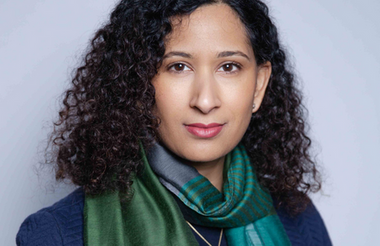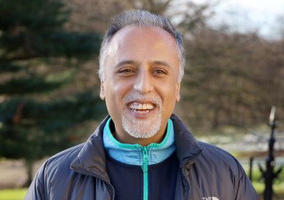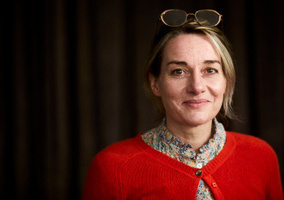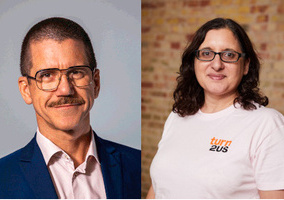Women’s Aid chief executive Farah Nazeer is focused on shifting societal culture to try and fulfil her charity’s mission of ending domestic abuse.
Since joining in March 2021, Nazeer has campaigned for more government funding for Women’s Aid’s 170 member organisations, which saw increased demand during the pandemic, and has called out misogynistic behaviour in mainstream culture such as on ITV’s Love Island.
“Everybody will know someone who is experiencing domestic abuse or who has perpetrated it,” she says.
“Until we get comfortable with being uncomfortable and calling it out we will not get to a place where it is not tolerated anymore.”
Nazeer, who was brought up in Mauritius, came to London by herself when she was 17. In what was a “formative period” for her she experienced what it was like to be on her own as a young woman, without much money, and without having full recourse to public funds.
“You experience the full onslaught of the system not being on your side. It very much made me think about social justice for women. It made me think about how society quite often marginalises women and stereotypes younger women.”
Nazeer has held senior roles in a number of organisations, including the Women's Institute, Bond, and Action Aid. She says she was increasingly questioning what a healthy relationship is to development when she saw the role at Women's Aid: “It was just a moment where I thought, actually, that's what I want to do”.
‘We are looking at societal attitudes and how they might be disrupted’
“One of the things that we are trying to do is to engender significant cultural change, because we very much see violence against women and girls as a spectrum,” says Nazeer.
“That does start from banter and sexist jokes and all of those things that might be perceived as harmless societal norms.”
She says this can cause a permissive environment for women to be thought of as less than men or to be thought of as property.
“We see that as a spectrum - it can start at banter and end as murder,” Nazeer says.
Women’s Aid is concerned about how to shift culture, because “if you look around there is so much out there that really perpetuates a culture of misogyny and sexism”.
Nazeer says men and boys are “absorbing” this culture and we as a society allow this to happen – “societally we're all responsible for this; it's not particularly a government or particularly anybody, it is all of us together”.
Under Nazeer’s leadership, Women’s Aid has commented on certain computer games and most recently on behaviour displayed on Love Island. The charity is currently in talks with ITV around this.
“It is utterly appalling so we do need to call things like that out and we will,” she says.
She says there are several issues with controlling behaviours being displayed on Love Island. First, that such behaviour should not be broadcast for entertainment, second, that people may see this behaviour as permissible, and lastly, that people may strive to emulate it.
“The climate has shifted and I think we as women’s rights organisations need to capitalise on that shift.
“That is largely off the back of organisations, like ours, really taking every opportunity to talk about it in ways that we hadn't done before. But also tragically, and I’d rather this had not been the case, the murders of the women last year and the police response to it.”
“It is not a race to the bottom,” she emphasises, but “it is shocking to see that when there is stranger danger and women are abducted by strangers that there is so much coverage, but three women a fortnight are murdered by their former or current partners and that doesn’t make it into the news,” – “that is just accepted” Nazeer says.
Women’s Aid have also launched a campaign called ‘Come Together to End Domestic Abuse’ which the charity is launching two years out of its 50th anniversary. It includes five calls to action that everyone can do.
The concept of the campaign is to “challenge the cultures that perpetuate and underpin misogyny and sexism that lead to domestic abuse”.
Women's Aid wants to get people involved in a number of ways. “It's not one silver bullet,” Nazeer says.
Campaigning: ‘You need the courage of your convictions to speak out’
Nazeer says her experience being a counsellor in Newham has given her insight into the complexities of policy making, how that's implemented, the risk factors and understanding how to navigate it.
“I like to think the vast majority of politicians are there to serve,” she says, but advises that charities must be vocal in their campaigning.
The chief executive does not believe in strict insider/outsider delineations. She says: “I think everything is a bit of both, but it is about what balance you use to serve the people you are seeking to serve.”
On campaigning, Nazeer says: “It is really important to know what you want to achieve and why, and who your target is. It sounds really basic but I often see campaigns which can't answer those questions. It is the same for an organisational strategy; know what you want to achieve and what you need to target, and what you need to do to reach that. I also think having the people you are seeking to serve absolutely at the centre of what you are doing [is key].”
Nazeer notes: “You also need the courage of your convictions to speak out. There are some things that you should not tolerate. There are some delays which are not acceptable. It is quite hard, but it is knowing when to judge that you do really need to speak out.”
‘Survivors are suffering immensely from the cost-of-living crisis’
Nazeer joined Women’s Aid during a “strange” time and says Covid had a huge impact on the charity and its members.
“We saw a significant rise in demand for our services; remote services, chat lines, help funds, email services, and so on.”
She adds that while a pandemic doesn't cause domestic abuse, “perpetrators will use it to exacerbate domestic abuse”. Avenues where people could find respite or seek help became more limited and the charity found far more complex cases than it would normally expect.
The chief executive explains that for a lot of services “that bread and butter” is to be with people, so the structure to work remotely “just wasn't there”.
There was government funding, “but like with everything in the pandemic it took time to come” and refuges weren't an immediate priority for PPE and so forth. There are also lots of small things that need to be thought of to “make the landscape easier for survivors” for example, some people may not feel able to wear masks.
“That huge impact on survivors and on children hasn't gone away. We are still experiencing that. It cannot be underestimated the depths of the impact. For online chats the demand went up by 41%. At one point there was a 21,000 long waitlist.”
Nazeer explains that's very difficult for survivors and also for staff as, “you're never going to meet that demand – it's not possible”.
The cost-of-living crisis has also had a huge impact on survivors in “compounding” what they've been through in the pandemic, she says.
“Domestic abuse almost always happens together with economic abuse, and access to finances is incredibly controlled.”
In a Women's Aid survey, 96% of survivors said the cost-of-living crisis had severely impacted their ability to flee abuse.
The ability to save a few pounds a week and at some point have enough to be able to make safety provisions in advance is really important, Nazeer says, and “it's become very, very clear that survivors are suffering immensely from the cost-of-living crisis”.
“They're not able to access the funds in order to provide the safety that they need to leave relationships, so it's quite devastating.
“It does weigh on our minds that we are going into a recession, and the cost of living is going up. I have some members that are having to use foodbanks, for survivors, for their staff as well. So it is fairly pressing that we get in as much funding as possible.”
“Those stories of harm and suffering will be felt across the charitable sector in the work that we all do,” she says, and suggests there may be more the charitable sector could do collectively on the cost-of-living crisis.
‘Engaging with anti-racism is a fundamental issue’
Nazeer says it is “an interesting place to be” as a woman of colour and chief executive in a mainstream organisation.
“You don’t come with the privileges of immediate acceptance and you always feel like you have to work harder or do more or do better. I think it is really hard to actually say ‘no, I am going to do what I think is right and the amount I think is right’. I want to be a good role model for other women of colour, so they don’t feel they need to do more than what is reasonable…Because otherwise they will burn out.”
She adds: “Every chief executive is under a lot of pressure, but I think there is an added expectation that you will do more and understand more on inclusion and diversity issues. That is probably the truth…I probably do understand a lot more by virtue of having lived experience of racism.”
Nazeer speaks to others in similar situations and says: “It is quite an interesting conversation which is being had right now among female chief executives of colour, because you have the burdens of being a woman chief executive, and there are expectations there, and then being a woman of colour there are further expectations.”
Ultimately, Nazeer says “needing to engage [with anti-racism] is a fundamental issue across the sector”.
“Invariably those black and minoritised women who are experiencing domestic abuse, a lot of migrant women fit within that context, often experience the worst forms of abuse and for longer and have fewer escape routes.
“A lot of that is because of the support context that exists out there. There aren’t public funds for those women and often they cannot access benefits in order to help them live in a refuge, and only one in five refuges that support black and minoritised women have any form of statutory funding. So, you have got the most marginalised women who need the most help with the least support and that is a complete tragedy and stain on society.”
Nazeer adds: “It is almost saying because you happen to be born somewhere else it is ok for you to continue to experience domestic abuse - that is kind of what it boils down to.”
The chief executive says it is unacceptable, but it is tolerated; “Why is it tolerated? Why is this the case? You have to look at our society as a whole.”
“There is racism within the sector, but there is also a huge drive to tackle it and address it and look at it in the face. It is the same for Women’s Aid. Our organisation nationally is doing lots of work on anti-racism including on quite a big plan to support our black and minoritised members.
“We are also doing an audit of our own racism and anti-racism within our organisation as well as a whole raft of training and appointing a head of anti-racism.
“Our mission is to end domestic abuse and violence against women and girls, and until we get there to ensure they have the best provision possible. So, we are very clear on what we need to do and what we need to do in the meantime.”
Lack of statutory funding
Nazeer says Women’s Aid’s 170 members “exist more on passion than any form of statutory funding”.
“The women that run those services are phenomenal. It is not statutory funding that supports survivors, it is these women.”
Nazeer notes there is £135m across the entire country for millions and millions of women.
“We have lots of survivors within the actual organisation and they really give their all,” she says.
“You have got huge amounts of women being affected and the funding does not touch it. A key objective for us is to support our membership to be as sustainable as possible.”
This means there is also a people challenge. She explains roles can be very emotionally demanding, and insecure funding and low wages mean people do not want, or cannot, stay in these roles.
“I am proud of so much, I have the most passionate, committed team of women working in the organisation that you could ever hope to find.”
Related Articles
Arfan Hanif: ‘We don’t need an EDI strategy – we just live it’
You can say lovely words like diversity and inclusion but we don't have to say it - we are it, Hanif tells Sam Wait
Celia Richardson: ‘At National Trust, we look at all aspects of cultural history’
Director of communications and marketing at National Trust, Celia Richardson, says its important to remain engaged with critics during times of controversy
Thomas Lawson and Sonya Ruparel: ‘Civil society upholds oppression. So, let’s fix it’
Thomas Lawson and Sonya Ruparel tell Sam Wait how they've been putting Turn2us' EDI strategy into practice












